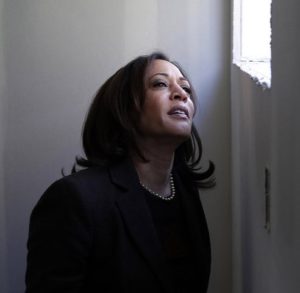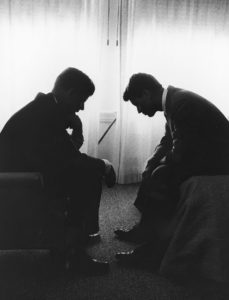Compiled from news sources and commentaries, with my own insights and observations
Joe Biden probably picked Kamala Harris as his running mate partly because he’s not taking the November election for granted, even though he currently leads in polls.
In that respect, Harris was “the strongest choice … vetted and tested through the rigors of the campaign trail in her own White House bid; a fierce adversary of President Donald Trump who had already shredded many of his nominees with her unsparing prosecutorial style in Congress; and a charismatic Black woman who could speak personally to the racial injustices that have surged to the forefront of America’s consciousness,” CNN political correspondent Maeve Reston wrote.
As for President Trump and his campaign team, “This was the pick that scared them the most,” MSNBC host Nicolle Wallace said. She believes Harris will “more than handle” Mike Pence in the vice presidential debate, adding they think she will “chew him up and spit him out.” Wallace believes, “I don’t know that there’s a better debater or questioner on the political field right now. Her skill set is unmatched.”
Of course, there’s more to the coming campaign than the debates.
Picking Harris signals the era of white male domination of presidential politics is coming to an end, in an increasingly diverse America where candidates are being judged not only on their personal qualities and abilities, but also gender and minority status. Biden simply didn’t have an option to pick a white male for vice president, and probably not a white female either (although Elizabeth Warren and Gretchen Whitmer were seriously considered to the very end).
There’s more. Historically, the vice presidency has been considered relatively powerless; but that’s changing, too. Even without current imperatives, our system has been trending toward a more powerful vice presidency. That’s because, as Atlantic journalist Christian Paz wrote, even “under normal conditions, the presidency and its manifold obligations are already too much for one person to handle.” Dick Cheney was a powerful figure in George W. Bush’s administration. And these are not normal conditions; with the challenges facing a prospective Biden administration, “There’s just no chance that the person who he picks is not [going to be] a consequential vice president or consequential historical figure. They just will be,” former Gore adviser Michael Feldman told Atlantic journalist Christian Paz.
 Paz also wrote, before Biden’s selection of Harris was announced, that “if Joe Biden wins in November, his running mate could become the most consequential vice president in modern American history. The woman Biden picks could be seen as a potential president-in-waiting, a signal for the Democratic Party’s agenda in the years to come, and perhaps the most significant player trying to help Biden manage a country—and a federal government—in crisis.”
Paz also wrote, before Biden’s selection of Harris was announced, that “if Joe Biden wins in November, his running mate could become the most consequential vice president in modern American history. The woman Biden picks could be seen as a potential president-in-waiting, a signal for the Democratic Party’s agenda in the years to come, and perhaps the most significant player trying to help Biden manage a country—and a federal government—in crisis.”
And if you listen to the journalists, Biden will be a one-term “transitional” president who will take America to the other side of the Covid-19 and economic crises and repair some of the damage Trump left behind, which opens a large opportunity for Harris — unless she screws up badly — to seamlessly move to center stage over the next four years, help shape the nation’s direction and her party’s future agenda, and position herself to become the almost inevitable 2024 Democratic presidential nominee.
Of course, none of this will happen if Trump wins re-election, which remains a distinct possibility. And even if he loses, he can stir up resistance among his followers, and if the GOP manages to retain its Senate majority, that could become a blocking force that would trap a Biden/Harris administration in a holding pattern, with little getting done outside of foreign relations, where the president has a freer hand than in domestic policy.
But the old ways are done. White privilege may linger for a while, but white supremacy is in its death throes. A majority of Americans will be non-white in a few years. Barriers for women and minorities are coming down. Politics will never be the same again. Nothing could be more emblematic of this than Biden’s selection of Harris; Maeve Reston wrote, “By selecting a Black woman — whose background as the daughter of Jamaican and Indian immigrants embodies the new American story — he recast the Democratic power structure for years to come.” She could as well have written, “America’s power structure, for the foreseeable future.”
Many people believe America is broken, or at least needs to change, and Harris is a change agent; Mother Jones’ Jamilah King wrote that her “entire career could be defined by … trying to effect change within a broken system.” One thing within her grasp now: helping lead a revived civil rights movement. Serendipitously, she would come to power precisely when America is tackling its racism issue as never before. The “little girl” she spoke about in the primary debates now is within reach of bringing about societal changes far beyond that little girl’s wildest imaginings.
But there’s something else to think about.
I’ve been observing government and politics for 60 years, and one thing I feel certain of is we can expect almost every new president to face an unforeseen crisis. It rarely fails to happen, and things almost never go according to plan. If it isn’t a Vietnam, a 9/11, or a virus, it’ll be something else. Such crises often totally preempt a presidency, derailing what the new leader hoped to accomplish, and leaving him with a binary destiny of becoming a hero who rises to the moment and masters it, or ends up as a goat. And it’s impossible to predict ahead of time who in his inner circle will become the key players when the shit hits the fan.
 In 1961, President Kennedy’s appointment of his younger brother Bobby as attorney general was widely viewed and criticized as nepotism. Bobby was young, only 36, and while energetic as a Senate staff lawyer, wasn’t who you’d expect to become the key player in a supremely dangerous foreign policy crisis. But that’s exactly what happened. Those of us who lived through it sensed the Cuban Missile Crisis was dangerous; but we didn’t know, until many years later, just how dangerous it actually was. We know now it almost blew up the world, and we also know it was Bobby, more than anyone else, who guided his brother to the decisions that prevented World War 3. No one could have predicted that in advance.
In 1961, President Kennedy’s appointment of his younger brother Bobby as attorney general was widely viewed and criticized as nepotism. Bobby was young, only 36, and while energetic as a Senate staff lawyer, wasn’t who you’d expect to become the key player in a supremely dangerous foreign policy crisis. But that’s exactly what happened. Those of us who lived through it sensed the Cuban Missile Crisis was dangerous; but we didn’t know, until many years later, just how dangerous it actually was. We know now it almost blew up the world, and we also know it was Bobby, more than anyone else, who guided his brother to the decisions that prevented World War 3. No one could have predicted that in advance.
We have to assume the next president, as any president, may be confronted with a crisis of similar magnitude. I won’t float “what-ifs;” there are many things in the world that can go wrong. If Biden is elected president, I don’t know what he’ll have to deal with, nor does he, which is the point. All I know for sure is that if things go south, we’ll be better off with a Bobby in the equation.
Leaders don’t choose these moments. They just happen. We elect presidents with a specific agenda in mind, but Murphy’s Law rules. I read all this stuff about why Biden chose Harris; what the pros and cons were; how this will affect the agenda, governing, and so on. But I can’t help thinking that Biden’s been around too long not to have considered the X factor. I’m far away from the action, but even from this distance, I sense that when in the final interview, when looked into Harris’ eyes, he saw what he was looking for. And that, I believe, was decisive.
After all, he’s said of her, “She could be president tomorrow.” If Biden, who’s been near serious power forever, trusts her that much, I think I do, too. But I don’t know what kind of history Biden and Harris will write, if they get a chance to write it. None of us do. The future is funny in that way; it has a mind of its own.
Kamala Harris is a poor pick. She does not gain Biden a single electoral vote, nor does she even shore up a region where he may be week. The west coast is golden for Biden, and for anyone the Democratic party runs, and if not well the Democratic nominee is toast.
She’s an excellent pick.
Consequential Vice Presidents are the ones who become President on the death of a President or elected to the office of President. Beyond their constitutional duty of presiding over the Senate it comes down to what the President lets the VP do. This cn be the mundane task of attending a state funeral somewhere in the world, what else the VP much of which the public never will know on the trip will show if the President thinks the VP is capable of heavy lifting or just a shoe shine boy or girl, and the President already has a cabinet to help him or her with all those important tasks he personally cannot handle.
After all the VP is often meant to trap an aspiring politician. Teddy Roosevelt election to the VP was really meant to end the mans political career, and happenstance made him one of Americas greatest Presidents so that plan did not work out, but frankly becoming VP is the end of the career for most who hold the office.
Being VP has often ended the careers of politicians who weren’t picked for their presidential qualities because they didn’t have any. Pence comes to mind but I can name other examples.